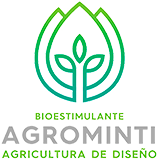Natural Bio-stimulant Mineral. Contribution of nutrients and trace elements Input for organic farming
It stimulates the growth of micro-organisms and thus allows the creation of a natural soil that favors the development of even healthier plants.
The application of agrominti in organic agriculture, helps to improve the architecture and ecosystem of the rhizosphere by stimulating its biological processes and favoring the physical-chemical reactions through the following properties of the mineral:
- Nutrients contribution : The organic availability of the 75 elements and trace elements
- Bio-stimulant: The energy of the long chain lipids that agrominti provides is converted, by co-metbolism, into an alternative net energy source in favor of a lower plant stress in terms of the photosynthetic energy disposition and a higher retention of organic carbon in the degradation of organic matter. This contribution of energy will stimulate the increase and growth of the microbial activity of the rhizosphere, improving the efficiency of the different biological processes carried out there, with special attention to the biological fixation and mineralization of nitrogen and the solubilization of matter organic
- Eliminates Toxicity: The ion exchange capacity of agrominti will facilitate, on the one hand, chelation through the adsorption of heavy metal ions, thus inhibiting the remaining toxicity of these metals and, on the other hand, helping to stabilize the absorption ratio of Sodium (SAR).
- Regulates the pH: The acidity or alkalinity of the soil is one of the main variables in soils, since it controls many of its chemical processes and affects both the availability of plant nutrients and the volatilization of nitrogen in the form of ammonia (NH3). The agrominti mineral typology favors the stabilization of the pH, improving the availability of these nutrients and reducing the volatilization of NH3 to the atmosphere.

